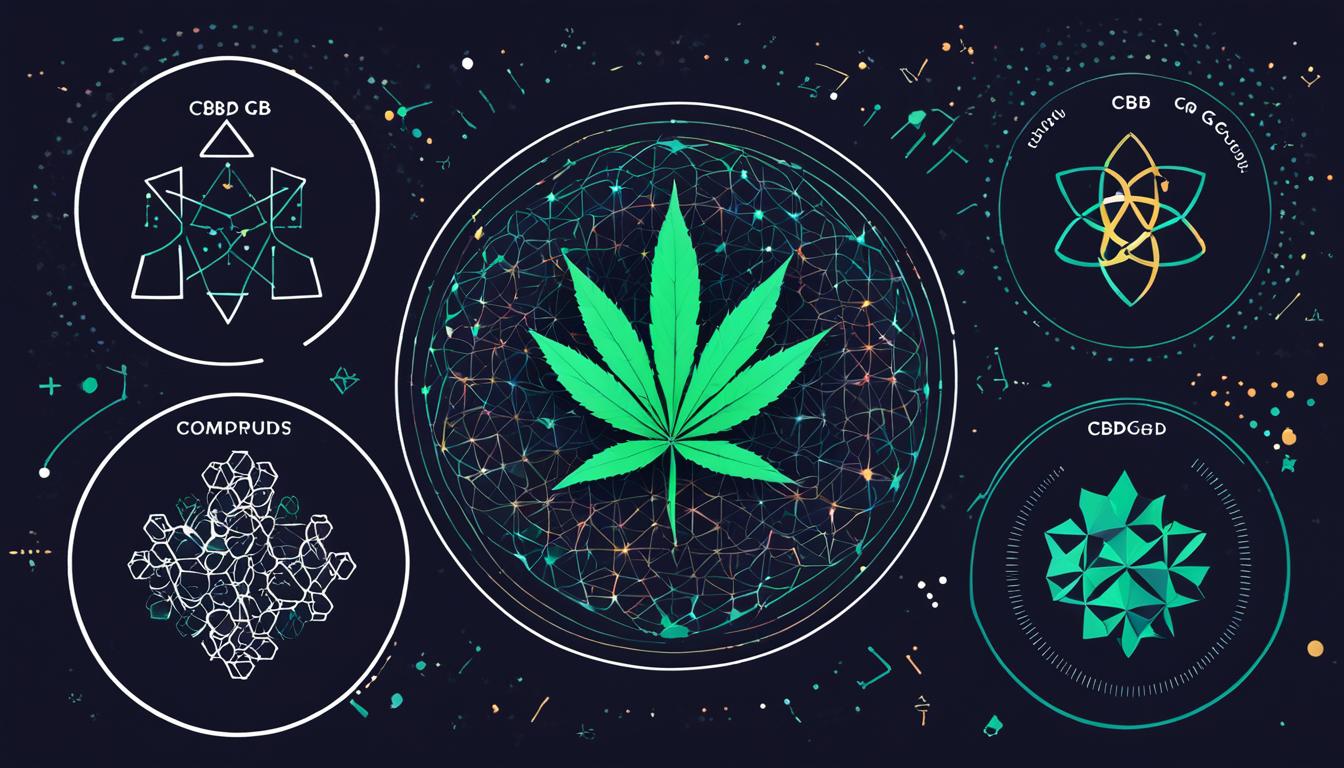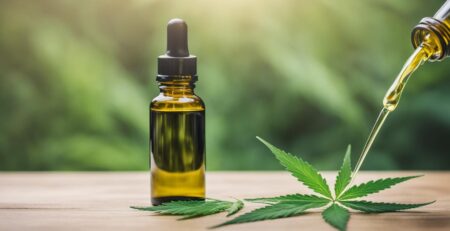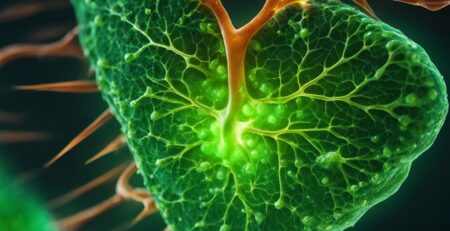CBD vs CBG: Effects, Benefits & Uses Compared
When it comes to cannabinoids, two names often come up in discussions: CBD and CBG. These compounds, found in the cannabis plant, have gained significant attention for their potential health benefits. But what exactly are CBD and CBG, and how do they compare? Let's dive in and explore the differences, effects, and benefits of CBD and CBG.
Key Takeaways:
- CBD and CBG are cannabinoids present in the cannabis plant, but CBD is more extensively researched.
- CBD has potential benefits for anxiety, epilepsy, Alzheimer's disease, and inflammation.
- CBG shows promise in treating cancer, combating bacterial infections, and aiding focus and concentration.
- Both CBD and CBG interact with the body's endocannabinoid system but act in different ways.
- Understanding the differences between CBD and CBG can help individuals choose the cannabinoid that suits their needs.
What is CBG?
CBG, or cannabigerol, is a minor cannabinoid found in the cannabis plant. It is often referred to as the “mother of all cannabinoids” as it is a precursor to other cannabinoids like THC and CBD.
CBG has unique properties and potential benefits, including aiding focus and concentration, fighting cancer cells, and acting as an antibiotic. While CBG is less common in plants than CBD, it offers a distinct set of therapeutic possibilities.
Research suggests that CBG may have potential benefits in the following areas:
- Aiding focus and concentration
- Fighting cancer cells
- Acting as an antibiotic
CBG has unique properties and potential benefits, including aiding focus and concentration, fighting cancer cells, and acting as an antibiotic.
CBG's potential as a therapeutic compound is still being explored, but it shows promise in various areas of health and wellness.
What is CBD?
CBD, or cannabidiol, is a well-known cannabinoid found in hemp and cannabis plants. It is non-psychoactive and has gained popularity for its potential benefits in reducing anxiety, improving sleep, managing pain, and supporting normal inflammatory function. CBD interacts with the body's endocannabinoid system to promote balance and wellness. Unlike THC, CBD does not cause a high sensation.
Research has shown that CBD has a wide range of therapeutic properties, making it a popular choice for those seeking natural remedies. Its ability to reduce anxiety has been promising, with studies suggesting that CBD can help individuals manage symptoms of generalized anxiety disorder, post-traumatic stress disorder, and social anxiety disorder. CBD's interaction with serotonin receptors in the brain contributes to its calming and mood-regulating effects.
In addition to its anxiolytic effects, CBD has also been studied for its potential benefits in sleep regulation. It may improve sleep patterns in individuals with sleep disorders, such as insomnia or anxiety-related sleep disturbances. CBD's calming properties contribute to its potential as a sleep aid, providing a natural alternative for those seeking better sleep quality.
Furthermore, CBD has shown promise in managing pain and inflammation. It has anti-inflammatory properties that can help alleviate chronic pain conditions, such as arthritis and neuropathy. CBD's interaction with the body's endocannabinoid system helps modulate pain signals, reducing pain intensity and improving overall pain management.
Overall, CBD offers a wide range of health benefits and is well-tolerated with minimal side effects. It provides a natural alternative for individuals seeking relief from anxiety, sleep issues, and chronic pain. Incorporating CBD into a wellness routine can promote balance and enhance overall well-being.
| Benefits of CBD |
|---|
| Reduces anxiety |
| Improves sleep quality |
| Manages pain and inflammation |
| Supports normal inflammatory function |
Differences Between CBG & CBD
While CBG and CBD are both cannabinoids with similar properties, they have distinct differences. CBG, or cannabigerol, is a minor cannabinoid found in lower concentrations in the cannabis plant compared to CBD, or cannabidiol. Understanding these differences is important for individuals looking to incorporate cannabinoids into their wellness routine.
CBG:
- Found in lower concentrations in the cannabis plant
- Has unique effects on appetite stimulation
- Acts as an antagonist to serotonin receptors
CBD:
- Supports normal inflammation function
- Aids in mood regulation
- Reduces stress
These differences make CBG suitable for individuals looking for appetite stimulation and its interaction with serotonin receptors, while CBD is more beneficial for supporting inflammation function, regulating mood, and reducing stress.
In summary, CBG and CBD offer unique properties and potential benefits. CBG is found in lower concentrations and has specific effects on appetite and serotonin receptors, while CBD supports normal inflammation function and aids in mood regulation and stress reduction. Understanding these differences can help individuals choose the cannabinoid that best suits their needs.
Comparing CBG and CBD
| Cannabinoid | Concentration in Cannabis Plant | Effects |
|---|---|---|
| CBG | Lower concentrations | Appetite stimulation, antagonist to serotonin receptors |
| CBD | Higher concentrations | Supports normal inflammation function, mood regulation, stress reduction |
CBG and CBD Interactions with the Body
Both CBG and CBD interact with the body's endocannabinoid system, albeit in different ways. These interactions contribute to the therapeutic effects of CBG and CBD.
CBG and its effects:
- CBG hooks onto CB1 and CB2 receptors
- Potentially improves brain function
- Reduces pain and inflammation
CBD and its effects:
- CBD gently encourages the body to produce more of its own endocannabinoids
- Promotes relaxation, stress reduction, and pain relief
These distinct interactions highlight the unique properties of CBG and CBD. While CBG primarily binds to receptors in the brain and can potentially enhance cognitive function while reducing pain and inflammation, CBD promotes a more natural balance within the body by stimulating the production of endocannabinoids. These effects contribute to relaxation, stress reduction, and pain relief. Understanding these interactions can help individuals make informed choices about incorporating CBG or CBD products into their wellness routine.
Health Benefits of CBG vs CBD
Both CBG and CBD offer a range of health benefits and have unique properties that make them valuable in the field of natural remedies.
CBG, or cannabigerol, has shown potential benefits in various areas:
- CBG may have potential in cancer treatment. Studies have indicated that CBG may inhibit the growth of cancer cells, making it an area of interest for further research and development.
- CBG acts as an antibiotic. Research suggests that CBG has antibacterial properties and may combat antibiotic-resistant bacteria, offering potential applications in fighting infections.
- CBG stimulates appetite. It has been found to have potential in promoting appetite, making it potentially beneficial in conditions where appetite loss is a concern.
- CBG may aid in treating neurological disorders. Preliminary studies have indicated that CBG may have neuroprotective properties and could potentially be used in the treatment of conditions like Huntington's and Parkinson's diseases.
CBD, or cannabidiol, has been extensively researched and has shown potential benefits in the following areas:
- CBD may provide relief for anxiety. Studies suggest that CBD has anxiolytic properties, potentially reducing symptoms of anxiety disorders and promoting a sense of relaxation.
- CBD has shown promise in epilepsy treatment. Epidiolex, a CBD-based medication, has been approved by the FDA for the treatment of certain forms of epilepsy.
- CBD may have potential benefits in Alzheimer's disease. Research has indicated that CBD may have neuroprotective and anti-inflammatory effects, potentially helping to manage symptoms associated with Alzheimer's disease.
- CBD may offer relief for chronic pain. Studies have suggested that CBD has analgesic properties and may help manage pain associated with conditions like arthritis and neuropathy.
With their distinct properties, CBG and CBD present promising avenues for natural remedies. Continued research and exploration are necessary to fully understand the extent of their health benefits and applications.
Benefits of CBG
CBG, or cannabigerol, offers a range of potential benefits in various therapeutic applications. Studies have shown its effectiveness in cancer treatment, as an antibiotic, and in stimulating appetite.
Cancer Treatment
Research has indicated that CBG may inhibit the growth of cancer cells, making it a promising option for cancer treatment. It has been explored for its potential in treating glioblastoma, an aggressive form of brain cancer.
Antibiotic Properties
CBG has shown promising results as an antibiotic, particularly in combating antibiotic-resistant bacteria. Its ability to fight bacterial infections offers potential alternatives to traditional antibiotics.
Appetite Stimulation
Stimulating appetite is another potential benefit of CBG. This is particularly important for individuals who may have a decreased appetite due to various medical conditions or treatments.
These findings suggest that CBG holds great promise in the field of natural remedies, offering potential benefits in cancer treatment, acting as an antibiotic, and stimulating appetite.
CBD for Stress and Anxiety
CBD has gained significant attention for its potential benefits in managing stress and anxiety. Research suggests that it may help reduce symptoms associated with generalized anxiety disorder, post-traumatic stress disorder, and social anxiety disorder. The calming and mood-regulating effects of CBD are attributed to its interaction with serotonin receptors in the brain.
“CBD has shown promise in reducing anxiety and promoting relaxation without causing drowsiness or altering perception.”
Studies indicate that CBD can provide relief from stress and anxiety without the side effects commonly associated with pharmaceutical medications. It offers a natural alternative that may help individuals achieve a greater sense of calm and tranquility in their daily lives.
If you're looking for ways to manage stress and anxiety, CBD products may be worth considering. Consult with your healthcare professional to determine the most suitable CBD regimen for your specific needs.
Benefits of CBD for Stress and Anxiety:
- Reduces symptoms of generalized anxiety disorder
- Alleviates post-traumatic stress disorder symptoms
- Helps manage symptoms of social anxiety disorder
- Promotes relaxation and calmness
- Mood regulation
- Natural alternative to pharmaceutical medications

| Benefits of CBD for Stress and Anxiety | How it Works |
|---|---|
| Reduces symptoms of generalized anxiety disorder | Interacts with serotonin receptors to promote a sense of calm and relieve anxiety symptoms. |
| Alleviates post-traumatic stress disorder symptoms | May help mitigate flashbacks, nightmares, and anxiety associated with trauma by influencing the endocannabinoid system. |
| Helps manage symptoms of social anxiety disorder | May reduce social anxiety symptoms, such as fear of public speaking or social interactions, by modulating brain activity and promoting relaxation. |
| Promotes relaxation and calmness | Interacts with GABA receptors, which are responsible for calming the nervous system, leading to a greater sense of relaxation. |
| Mood regulation | Affects serotonin receptors in the brain, influencing mood and promoting emotional well-being. |
| Natural alternative to pharmaceutical medications | Provides a non-addictive option for managing stress and anxiety without the side effects commonly associated with certain medications. |
CBD for Sleep
Sleep plays a crucial role in our overall well-being, yet many individuals struggle with sleep disturbances such as insomnia. Fortunately, CBD, or cannabidiol, has emerged as a natural remedy with the potential to improve sleep quality and alleviate insomnia.
Studies have shown that CBD may have a positive impact on REM sleep patterns in individuals with Parkinson's disease, leading to more restful and rejuvenating sleep. Additionally, CBD's calming effects can help address anxiety-related sleep disturbances, allowing individuals to experience more restorative sleep.
The use of CBD for insomnia is particularly promising. By interacting with the body's endocannabinoid system, CBD promotes relaxation and reduces anxiety, creating an environment conducive to quality sleep. Unlike traditional sleep medications, CBD offers a natural alternative that does not cause dependency or grogginess upon waking.
While ongoing research is further exploring the effects of CBD on sleep, early findings suggest its potential as a safe and effective sleep aid. Incorporating CBD into your bedtime routine may help you experience the benefits of a good night's sleep.
| Benefits of CBD for Sleep | Evidence/Findings |
|---|---|
| Promotes relaxation | CBD's calming effects can help calm the mind and prepare the body for sleep. |
| Reduces anxiety | CBD's interaction with the endocannabinoid system helps reduce anxiety, a common cause of sleep disturbances. |
| Improves sleep quality | Research suggests that CBD may enhance sleep architecture and improve the duration and quality of sleep. |
| Alleviates insomnia | CBD has shown promise in addressing insomnia and promoting a more regular sleep-wake cycle. |
When using CBD for sleep, it's important to find the right dosage and product that works for you. Consulting with a healthcare professional or knowledgeable CBD specialist can help determine the appropriate CBD regimen tailored to your specific sleep needs.
Remember, while CBD holds promise as a natural sleep aid, individual responses may vary. It's always recommended to seek professional guidance and carefully monitor your sleep patterns when incorporating CBD into your routine.
CBD for Pain Relief
CBD, or cannabidiol, has emerged as a potential solution for managing pain. Studies have shown that CBD may provide relief for chronic pain conditions such as arthritis and neuropathy. One of the main ways CBD helps with pain relief is through its anti-inflammatory properties. By reducing inflammation in the body, CBD can alleviate pain and improve overall comfort.
CBD interacts with the body's endocannabinoid system, which plays a crucial role in regulating pain perception. By interacting with receptors in the nervous system, CBD can help modulate pain signals and reduce pain intensity. This makes it a promising natural alternative to traditional pain medications, which often come with unwanted side effects and risks.
In addition to its anti-inflammatory effects, CBD may also help improve pain management by directly targeting the underlying causes of pain. CBD has been found to interact with various receptors involved in pain signaling, including TRPV1 receptors, which are responsible for the sensation of pain and inflammation. By modulating these receptors, CBD can help reduce pain sensitivity and promote better pain management.
Studies have shown that CBD can reduce pain intensity and improve pain management.
Furthermore, CBD's analgesic properties can have a positive impact on chronic pain conditions such as fibromyalgia and multiple sclerosis. By reducing pain and improving overall comfort, CBD can significantly enhance the quality of life for individuals living with chronic pain.
While CBD offers promising benefits for pain relief, it is important to note that individual responses may vary. The optimal CBD dosage and delivery method may differ depending on the individual's specific needs and the underlying cause of pain. It is always recommended to consult with a healthcare professional before incorporating CBD into a pain management routine.
Benefits of CBD for Pain Relief:
- Reduces inflammation and alleviates pain
- Modulates pain signals in the nervous system
- Promotes better pain management
- Enhances the quality of life for individuals with chronic pain
Overall, CBD has demonstrated great potential in providing relief for chronic pain. Its anti-inflammatory effects, pain modulation properties, and analgesic properties make it a valuable option for individuals seeking a natural solution for pain management.
| Benefits of CBD for Pain Relief |
|---|
| Reduces inflammation and alleviates pain |
| Modulates pain signals in the nervous system |
| Promotes better pain management |
| Enhances the quality of life for individuals with chronic pain |

By incorporating CBD into a pain management routine, individuals may experience improved comfort, reduced pain intensity, and enhanced overall well-being.
Legal Status of CBD and CBG
When it comes to the legal status of CBD and CBG, it's important to understand the regulations at both the federal and state levels in the United States. While CBD has gained wide acceptance, CBG is still undergoing research and development, resulting in less regulatory oversight.
At the federal level, CBD and CBG are both legal as long as the products contain less than 0.3% THC, the psychoactive compound found in cannabis. This threshold ensures that the products do not have a significant potential for abuse or cause intoxication.
However, it's crucial to note that the legal status of CBD and CBG can vary from state to state. Some states have adopted more progressive measures, allowing for broader use and distribution of CBD and CBG products, while others have stricter regulations or even prohibited their use.
To navigate the legal landscape and ensure compliance, it is essential to check the specific laws in your state before purchasing or using CBD and CBG products. This will help you avoid any legal implications or complications that may arise from non-compliance.
| Legal Status | CBD | CBG |
|---|---|---|
| Federal Level | Legal ( | Legal ( |
| State Level | Varies (check individual state laws) | Varies (check individual state laws) |
Table: Legal Status of CBD and CBG
As the popularity and understanding of CBD and CBG continue to grow, it is expected that regulations will further evolve to accommodate the needs of consumers. Staying informed about the legal landscape surrounding CBD and CBG will help individuals make informed decisions about their purchase and use.
CBG vs CBD in Production
When it comes to production, there are notable differences between CBG and CBD. CBG, or cannabigerol, is more challenging to produce compared to CBD due to its lower concentrations in cannabis plants. Specialized breeding and extraction techniques are necessary to obtain significant amounts of CBG.
CBD, on the other hand, is more readily available and easier to extract from both hemp and cannabis plants. This abundance of CBD in plants makes it a more accessible cannabinoid for production purposes.
These variations in production processes ultimately lead to differences in availability and cost between CBG and CBD products.
Comparison of CBG and CBD Production
Production of CBG:
- CBG is derived from cannabis plants, specifically those with high CBG content.
- Specialized breeding techniques are used to cultivate cannabis plants with higher CBG concentrations.
- Once the plants are grown, extraction methods such as CO2 extraction or solvent extraction are utilized to isolate the CBG compound.
Production of CBD:
- CBD is obtained from both hemp and cannabis plants, with hemp being the primary source due to its higher CBD content.
- Hemp plants are cultivated for their CBD-rich flowers, which are harvested and processed to extract CBD oil.
- Extraction methods such as CO2 extraction or solvent extraction are commonly employed to obtain CBD isolate or full-spectrum CBD oil.
Although both CBG and CBD offer unique therapeutic potential, the differences in their production processes impact their availability and cost. CBG, with its more complex production requirements, may be less readily available and potentially more expensive compared to CBD.
The image above illustrates the differences in the production processes of CBG and CBD.
CBG and CBD Side Effects
CBG and CBD are generally well-tolerated compounds with minimal side effects. When using CBG or CBD products, it's important to be aware of potential side effects and consult with a healthcare professional.
Some common side effects of both CBG and CBD may include:
- Dry mouth
- Mild gastrointestinal discomfort
Additionally, CBD may cause fatigue and interact with certain medications, so it's crucial to discuss CBD usage with a healthcare provider, especially if you are taking other medications.
It's essential to monitor individual reactions to CBG and CBD and consult with healthcare professionals to ensure safe and effective use of these compounds.
Quote:
“CBG and CBD are generally safe for use, but it's always a good idea to consult with a healthcare professional before incorporating them into your wellness routine.”
Comparative Table: CBG vs CBD Side Effects
| CBG Side Effects | CBD Side Effects |
|---|---|
| Dry mouth | Dry mouth |
| Mild gastrointestinal discomfort | Mild gastrointestinal discomfort |
| – | Fatigue |
| – | Potential drug interactions |
Conclusion
CBD and CBG are two cannabinoids that offer unique properties and potential health benefits. CBD has undergone extensive research and is widely accepted for its potential in managing stress, anxiety, sleep issues, and pain relief. On the other hand, CBG shows promise in cancer treatment, combating bacterial infections, and aiding in focus and concentration.
Both CBD and CBG provide natural alternatives for individuals seeking wellness and balance in their lives. When incorporating CBD or CBG products into a wellness routine, it is essential to consider individual needs and consult with healthcare professionals.
Whether you are looking for stress relief, better sleep, or pain management, CBD and CBG offer potential solutions. Exploring the benefits of these cannabinoids can empower individuals to make informed choices about their well-being and find natural alternatives to support their health.
FAQ
What is the difference between CBD and CBG?
CBD and CBG are both cannabinoids found in the cannabis plant. While CBD has been extensively researched and is known for its potential benefits in managing anxiety, epilepsy, Alzheimer's disease, and inflammation, CBG is a minor cannabinoid with promising potential in cancer treatment, combating bacterial infections, and aiding in focus and concentration.
How do CBD and CBG interact with the body?
Both CBD and CBG interact with the body's endocannabinoid system, but they act in different ways. CBG hooks onto CB1 and CB2 receptors, potentially improving brain function and reducing pain and inflammation. CBD encourages the body to produce more of its own endocannabinoids, promoting relaxation, stress reduction, and pain relief.
What are the health benefits of CBG?
CBG has shown potential benefits in cancer treatment, acting as an antibiotic, stimulating appetite, and potentially aiding in treating neurological disorders. Studies have found that CBG may inhibit the growth of cancer cells and combat antibiotic-resistant bacteria.
What are the health benefits of CBD?
CBD has been extensively studied and may provide relief for anxiety, epilepsy, Alzheimer's disease, and chronic pain. It has also shown promise in promoting quality sleep and managing stress.
Is CBD or CBG better for anxiety?
CBD has been studied for its potential benefits in managing stress and anxiety, and it may help reduce symptoms of generalized anxiety disorder, post-traumatic stress disorder, and social anxiety disorder. CBG, on the other hand, is still undergoing research in this area.
Is CBG or CBD better for sleep?
CBD has shown promise in promoting quality sleep and may help alleviate insomnia and anxiety-related sleep disturbances. CBG's potential in sleep-related issues is still being explored.
Is CBD or CBG better for pain relief?
CBD has been studied for its potential benefits in managing pain and may provide relief for chronic pain conditions such as arthritis and neuropathy. CBG's potential in pain relief is still being researched.
What is the legal status of CBD and CBG?
CBD and CBG are federally legal in the United States as long as the products contain less than 0.3% THC. However, the legality of CBD and CBG may vary at the state level, so it is important to check individual state laws before purchasing or using these products.
How are CBG and CBD produced?
CBG is more challenging to produce compared to CBD due to its lower concentrations in cannabis plants. Specialized breeding and extraction techniques are necessary to obtain significant amounts of CBG. CBD, on the other hand, is more readily available and easier to extract from hemp and cannabis plants.
What are the side effects of CBD and CBG?
CBD and CBG are generally well-tolerated compounds with minimal side effects. Common side effects may include dry mouth and mild gastrointestinal discomfort. CBD may also cause fatigue and can interact with certain medications.
Should I consult with a healthcare professional before using CBD or CBG?
It is important to monitor individual reactions and consult with healthcare professionals before using CBG and CBD products, especially if you have any underlying health conditions or are taking other medications.











Leave a Reply